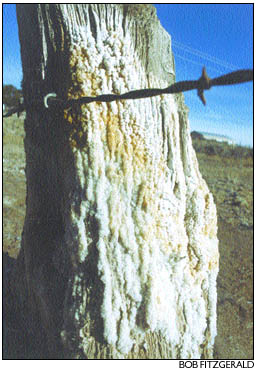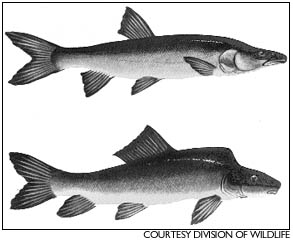|
Dec. 2, 2000 By Jim Mimiaga
Two environmental groups have raised concerns that a local ag project approved for financing by the state water board could threaten sensitive fish species in the lower Dolores and San Juan rivers. Trout Unlimited, a national group advocating protection of fish and riparian habitat, told the Colorado Water Conservation board at its Nov. 20 meeting that the Colorado pike-minnow in the lower Dolores near the Colorado River could suffer from saline poisoning if the project goes ahead. That fish, in addition to the razorback sucker in the San Juan River, is listed as endangered by the U.S. Fish and Wildlife Service under the Endangered Species Act. Trout Unlimited is also questioning whether the sale of 6,000 acre-feet of water by the Montezuma Valley Water Company to the Dolores Water Conservancy District is legal. The group claims that the water slated for purchase and delivery to 4,000 acres, now dryland farms, should continue to flow down the Dolores River from McPhee Reservoir for environmental purposes. If used on the new acreage, the runoff water will reach the San Juan River instead, which Trout Unlimited says would increase damaging salt and mineral build-up there. At issue is salination, a process caused when irrigation water percolates through soils, picking up minerals that eventually are deposited downriver after evaporation. The result can be damaging levels of salt build-up harmful to river habitats and water quality. Melinda Kassen, Trout Unlimitedís Colorado director for western water projects, said Friday that the plan to expand irrigable lands uses "salvage water" saved as a result of a federally funded desalination contract created to increase irrigation efficiency and reduce salt-loading from return flows. Lining canals to prevent waste and using sprinklers rather than flood irrigation are the two main tactics for salinity control. "The water saved because of the program funded by taxpayers is meant to go downstream for habitat purposes, not to be sold for additional irrigation that will then cause increases in salination for both the Dolores and San Juan River," said Kassen.
Kassen believes the proposal by the DWCD to purchase MVIC water ó which she says is reserved for downstream fisheries ó should go to the state water court for resolution. She points to recent studies that show the presence of the pikeminnow in the Dolores River, where it had not been known to live before, as reason for preserving higher Dolores River flows. The DWCD refutes Trout Unlimitedís claims, arguing that the water being bought has already been allocated but has not been used for some time because of a limited MVIC delivery capacity. District officials also say the districtís obligation to the salinity project is not being unfairly compromised because of the project, since only 10 percent of the salinity program was paid for out of federal tax dollars. All sides are awaiting the conclusions of a biological opinion being prepared by the Bureau of Reclamation in conjunction with the U.S. Fish and Wildlife Service concerning the environmental impacts downstream. The bureau has submitted a draft environmental assessment which notes that water transfer "should have little effect on fish and wildlife resources," and that the "water is private and not available for the McPhee Reservoir downstream fishery pool." The EA notes that 6,000 to 8,000 acre-feet would be depleted from the Dolores River Basin for use on drylands, but that the new use of the water "may affect endangered fish species and their critical habitat in the Colorado River," depletions which are addressed under existing agreements. The Rocky Mountain Chapter of Environmental Defense also expressed concerns about potential downstream pollution as a result of increased agriculture, but emphasized that solutions be sought that allow for expanded farming and river-habitat protection. "We recognize ag is an important value and we do not oppose irrigated farming, but there are a bunch of environmental questions that need to be answered with this project," said Jim Martin, a senior attorney with Environmental Defense. Martin said that the question of whether the water being put up for sale by the MVIC is actually theirs to sell represents "a very interesting legal question, and the answer is not immediately apparent." Federal expenditures designed to reduce salinity in the Colorado River system were contracted with MVIC and the DWCD, agreements that do not allow water saved to be used in a way that increases salt-loading downstream. "Our concern is that the project will increase salinity in the San Juan River, and that withdrawing it (water) from the Dolores River will hurt the dilution factor there," said Martin. "We are optimistic that there are creative solutions out there," said David Nickum, executive director for Trout Unlimited. "But biases have to be checked at the door for those discussions to go anywhere." |
||||
|
Copyright © 2000 the Cortez Journal.
All rights reserved. |

